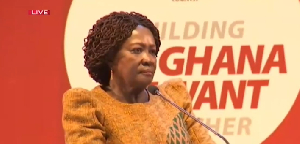Politics of Wednesday, 1 January 2020
Source: ghananewsagency.org
EC intends to compile new voter register
The Electoral Commission has announced its intention to compile a new voter register in the first quarter of next year for election 2020 and beyond.
The Commission said the new voter register would include facial recognition to eliminate manual verification at the polling stations thereby ensuring credibility and integrity of the elections.
Mr Samuel Tettey, Deputy Chairman-in-Charge of Operations speaking at a press briefing said in the just ended District Level Elections held in 2019, out of a total number of over Five Million verified, about Thirty-Four Thousand, were manually verified.
He said the figure was a significant number, which could determine the winner of an election.
Mr Tettey said the Commission had begun an international competitive tendering process towards the procurement of Devices and other equipment they would need.
He noted that the EC would bring out a calendar, which would specify the dates and venue for all its activities. The first registration would run for forty days.
Mr Tettey noted that the country started using biometrics in its elections and had, become an important tool for voter identification and verification.
Proposed New Biometric Voter Management System (BVMS)
He stated, “This is particularly important for the registration of voters who either have amputated finger digits or the nature of their occupation results in their fingerprints being unreadable”.
Mr Tettey said the proposed new system could withstand the harsh climatic conditions that prevail in certain parts of the country and could operate in dusty, humid environments at temperatures ranging from 5 to 45 Degrees Celsius, with humidity between 20 and 90 per cent.
Enumerating the benefits of the new system, he said it would have hardware vendor-agnostic software solution that would run on the commercial of the shelf (COTS) device preventing vendor lock-in.
“The new BVMS would also have a software applications that are built on well documented standard and open development languages that could be easily enhanced and maintained by the EC’s own staff,” he said.
“It would replace VSAT Wide Area Network by secure (encrypted), faster and more efficient microwave radios provided by the telcos”.
Mr Tettey stated that the system would see the building of a new Data Centre and Disaster Recovery Centre to replace the current Datacentres commissioned in 2012.
According to him, it would provide a new server and storage system that would be able to deduplicate millions of biometric records in the shortest possible time to meet the requirements of the election timetable.
Mr Tettey explained that the system would increase the accessibility of all eligible voters nationwide to the BVMS to register and update voter record thus making it more credible.
Additionally, he noted that the capacity of the EC IT staff would be built through training and knowledge transfer to enable to self-manage new systems without vendor dependency.













